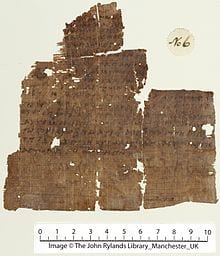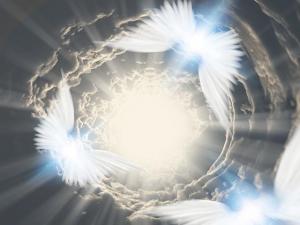
Angels and devils don’t usually figure in our calculations about how to solve our problems. We live in a largely disenchanted world, as my last post described. But to settle for that disenchanted world is to give away too much. This post takes a cue from a 1960’s civil rights activist. At the 1964 Democratic National Convention, Fannie Lou Hamer spoke up against racism in American politics. She described a struggle that was not so much against flesh and blood as against what St. Paul called Principalities, Powers, and Rulers of Darkness.
Principalities, Rulers of Darkness, and other such powers are among the realities that the New Testament imagines beyond the realm of sight – the things invisible of the Nicene Creed. Yet these things have their visible, material counterparts or embodiments. The material and spiritual worlds are not so separate, in the greatest part of the Church’s tradition, as we might imagine. This post leads into that early and mostly, but not entirely, foreign imagination. Fannie Lou Hamer’s story will get us into what I hope will be a authentically New Testament way of viewing angels and devils.
Hamer at the Democratic National Convention
Fannie Lou Hamer was a leader of the black Freedom Democratic Party in its 1964 campaign to be seated for the state of Mississippi at the Democratic National Convention. Mississippi had always excluded blacks from the national convention. I remember it as one of many dramatic moments in the America of the 1960’s.
The black delegation marched into the meeting hall and challenged the white delegation for the right to represent the state. The convention had to decide. They came up with a compromise which the Freedom Democrats could not accept. Their success came later when the national party forbade discrimination on the basis of race by any state party. That ended the era of “Yellow Dog Democrats,” southerners who would vote for a yellow dog provided it was a Democrat—and white, of course.
What we’re up against
Here’s what civil rights leader Hamer said on that occasion in 1964:
We have to realize just how grave the problem is in the United States today, and I think the sixth chapter of Ephesians, the eleventh and twelfth verses help us to know what it is we are up against. It says, ‘Put on the whole armor of God, that ye may be able to stand against the wiles of the devil. For we wrestle not against flesh and blood but against principalities, against powers, and against the rulers of the darkness of this world, against spiritual wickedness in high places. This is what I think about when I think of my own work in the fight for freedom. (Quote is from Common Prayer for Ordinary Radicals, p. 419.)
She could have pictured a struggle against individual bad guys. But I think the way she put it is more accurate. The epic struggle for civil rights was (and is) not just against individuals. There are larger things—patterns, structures, systems, institutions, ideologies, ways of thinking and using language, roles in society. These are bigger than any or all of us. We imagine that they are under our control, that we have created them and we can change them. But we grow up within them. They make us as much as we ever made them.
Paul and the “powers”
In his letters Paul has many names for the larger than life realities that form the context of our lives. They are principalities, thrones, dominions, just plain powers, and more. Though larger than life, they are part of life as well. Paul says that they killed Jesus. He also says that they will be destroyed.
It’s a strange thought because the ones who killed Jesus are characters like Pilate, Herod, and the high priest Caiaphas. These folks were probably all dead by the time Paul wrote, 20-some years after Jesus’ crucifixion. Why does he say they “will be” destroyed? Paul was speaking of powers acting through flesh and blood creatures who murdered Jesus. These were active also in Paul’s day, and in our day they are still only going to be destroyed.
It was not mere flesh and blood but some larger realities that Fannie Lou Hamer saw as the enemy she had to fight. The Freedom Democrats eventually won their battle, but those same powers are still operating. We saw them in Nazi salutes, white-robed figures with tiki lamps in parade, and a newspaper editor who only recently called for the Ku Klux Klan to return. The same thing that found expression in Roman military, economic, and religious imperialism at the time of Jesus appears in a different embodiment today in the imperialism of financial systems, with their military support.
Angels and devils
I will be tracing out a space for the return to a disenchanted world of realities known, in the Church’s mythical language, as angels and devils. These won’t be the domesticated spirits you find in country western songs:
Angels above us and angels who take us by the hand and lead us home when it’s our darkest hour and we’re lost in the woods alone.
They won’t be the silver-screen kind of devils that you ward off with just a prayer and a crucifix, either.
I agree with Fannie Lou Hamer: We absent ourselves from the largest part of the battle if we think we’re only fighting individual creatures of flesh and blood. But neither can we take up our rightful Christian battle positions without the flesh-and-blood—the political—struggle against injustice.
Good people doing evil things
Demons are real enough, but when we stop fighting each other and start talking across divides, we often find that we can’t readily demonize our adversaries. It becomes much harder to locate the evil in the other individuals. We see them as people who are doing what has always been done or else people who simply feel powerless to change anything.
Not, of course, in every case. There are evil people doing evil things. But good people also do evil things. To speak mythologically and perhaps truly, good people doing evil things is the best indicator of the power of the devil. It’s a power that is embodied in human individuals and how they act and think, but it’s not limited to any one or combination of individuals. It’s larger than life, and maybe that’s one way of saying spiritual.
I’ve been describing bad “angels” “They are spiritual powers operating within our world. That leaves several questions for future posts on the Creed’s “things invisible” to investigate:
- What about good angels?
- Where do the bad ones come from, assuming that God creates only good things?
- Finally, what about the non-human world? Is the human world with its angels, or spiritual side, disconnected from the rest of reality, as Descartes would have it; or are there angels of the non-human world, too? Does our human world get any support—or opposition—from the non-human world, as ancients believed?
Image credit: Pinterest via Google Images












